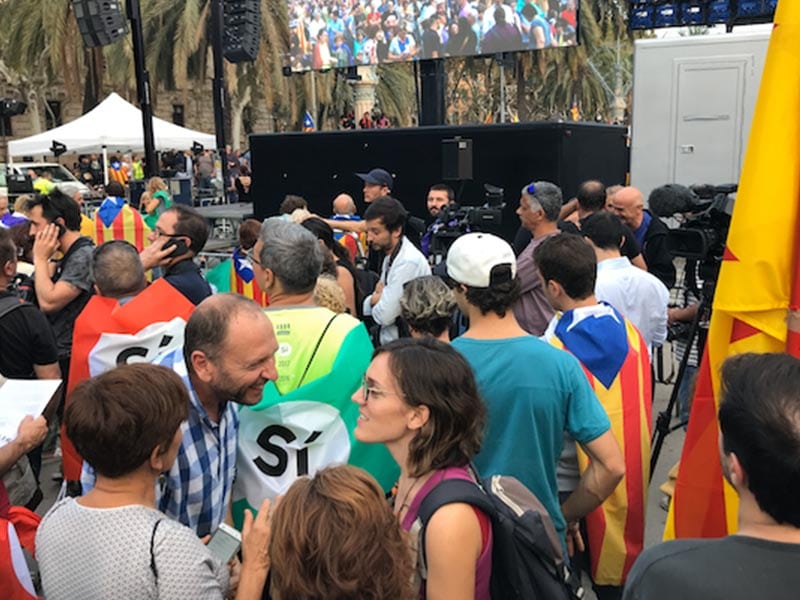2017
On August 17, 2017, a terrorist attack shook Barcelona and the world.
August 17, 2017 was a very sad day. What happened is probably not worth explaining because everyone’s heard about it. It was something truly terrible that, surely, could have been prevented.On August 17, the day of the Barcelona attacks we decided to leave Barcelona for Vallvidrera.We took a train, the Catalan train line,and arrived back at Plaça de Catalunya a few minutes before the attack. Like everyone else, we had no clue what was about to happen. We were working, as usual, in our office, when suddenly, we heard helicopters, the police, and a lot of people on the move. Then we discovered that there had been an attack on the city. My wife told me. She was watching the news. I had many colleagues there, and, as well, colleagues within my unit, on the scene. Absolutely everyone living in Barcelona has been on Las Ramblas. Everyone. So it’s shocking since it’s a place you’ve been a thousand times, and you can’t help thinking, “It could’ve been me.” I meet friends frequently on Les Rambles. A van was mowing down everything in its way. More people running, the police running back and forth, unaware of who they were looking for, nor where, because apparently the driver, with everyone running, was difficult to locate. I walk along Las Ramblas every day since returning to Barcelona at the end of the month. Through Plaça de Catalunya, Portal de l’Àngel, Escudellers, etc. Every day. Every day. I have to. Otherwise I’d be scared. We’re not used to such things. Personally…we were afraid. After a couple of minutes, I was able to find her. She told me she was alive but couldn’t say that she was actually OK, because she was in a state of total shock…All I could think about was the children, because it’s an area in Barcelona filled with children. Panic spread. People were crying, shouting running. Some ran away. Others didn’t know what to do. When the van reached Las Ramblas and started weaving, apparently this man tried to stop the driver, but when he saw his family torn to pieces, he went into shock. Now we do know what happened. The terrorists were killed, but I don’t think that’s good either. The terrorists killed lots of people and we killed the terrorists. I remember, at the time, that many were complaining about excess tourism.And tourists accounted for the majority of the casualties, so now…they will, forever, be from Barcelona. In all, the Barcelona attack on August 17, 2017 resulted in 13 deaths and more than 130 injuries.
Barcelona residents discuss thew referendum that took place on October 1, 2017.
We don’t know what’ll happen, because fear is free. Fear is truly free. On October 1st, the day of the referendum, the reinforcements that had been hunkered down in Barcelona’s port for 10 days, disembarked, joining thousands of National Police and Guardia Civil troops already stationed throughout the city. The mission hadn’t changed: Stop the vote. But they couldn’t do it. 00:00:31,865 –> 00:00:32,899 During the first hour of voting, a single table had a working web address. Then it was given to me, and I passed it along to other tables. The table that had immediate access was able to register two or three votes digitally. Moments later, the site was blocked, replaced by the Civil Guard logo, and voting stopped. I voted in the morning, and then returned to my parents’. As we ate lunch, an avalanche of news pored in, as well as images of what was going on in Barcelona, and in other towns. There were scenes of great violence in some small Catalan villages. Seeing it all really shook you to the core. I grew very anxious, thinking, “I can’t stay home while this is happening to people in my community.” And there have been massive demonstrations, unprecedented in Europe. In terms of persistence, turnout, civility and pacifism. We stand accused of violence, but unless violence is singing songs, I don’t know what violence is. I remember my mother’s arrival. She’s 80, but beautiful and fit. She looks 68, but she is 80. In case she is watching. She arrived with two friends, I said, “Listen, it’s almost 11.” “With the computers down, voting here will be difficult.” “Go home. I’ll call when things calm down, and it’s marginally safe to vote.” They said, “No way. We’re not going anywhere.” 00:02:51,371 –> 00:02:55,008 That is why I must say, these old ladies… have a thousand times the dignity of those bastards smacking people with nightsticks. While all figures related to the referendum remain controversial, be it vote count or injuries sustained during the course of the day, the Catalan government estimated that 2.2 million votes were cast and counted, representing 42% of the electorate. The Yes vote, unsurprisingly, won in a landslide, with 92% favoring independence. Police operations had succeeded in nullifying 770,000 potential votes, with approximately 1,000 injuries to civilians reported. That day…look, I have goosebumps. That day, the people didn’t just pore out en masse demanding independence. Shouts for independence could be heard, of course. But they were out there protesting the repression unfairly incurred by the elderly. Those peacefully going to vote suffered, in spite of how little violence occurred on October 1st. I mean, yes, we’ve seen images of vandalized police cars, but generally speaking, it was ballot-holders against nightsticks. Some talk of a Silent Majority, but in Catalunya it is a very active majority. The proof is that we voted.
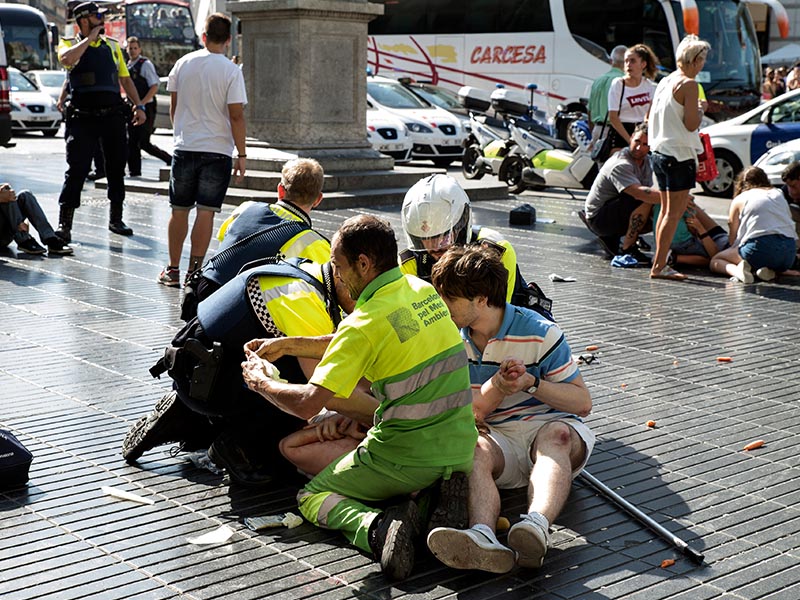
2017 – Terrorist attack on Barcelona’s Las Ramblas
Jaume Muñoz discusses films and books that do Barcelona justice.Art holds a mirror to society. There are many books worth reading, and films worth watching that will shed light on the Catalan personality. If you’re interested in post-war Barcelona, read The Time of the Doves by Mercè Rodoreda. It deals with a Gràcia family after the war. Its focus is on a young woman’s struggles, giving us a sense of where we come from. My grandmother used to play in plaça del Diamant, in Gràcia. It’s a good introduction to life in Barcelona during the 1950s. It’s a good introduction to life in Barcelona during the 1950s. I don’t recommend Vicky, Cristina, Barcelona by Woody Allen. Instead, watch “In the City.” It examines the daily lives of eight, thirty-something friends living in Barcelona. The restaurants where they eat, the bars they frequent, the concert venues… To seeing how middle-class educated adults lived in Barcelona in 2000, it’s your film. Then there’s this comedy, The Spanish Hostel. I kind of lived that myself. Barcelona is experienced through the eyes of a young, French man. When it comes to books…Again, read The diaries by Josep Pla.
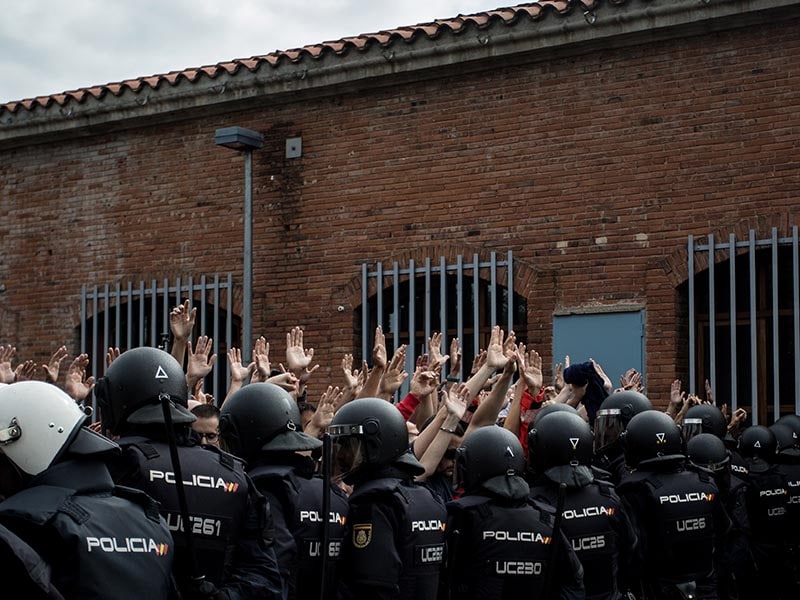
2017 – Police blockade during October 1st Referendum vote
Jordi Pérez O’Shea discusses Spanish political party Podemos.So, Podemos is a political party that was created in 2014. It would represent something similar in terms of programme and the change it is. It promotes to what Bernie Sanders would represent in the US or Jeremy Corbyn in the UK. So, a break with a way of doing politics where, to put it simply, the rich will always get richer and everybody else gets… gets crushed. Podemos emerged as a response to a two-party system in Spain that had held power very tightly for close to 40 years. And which was incapable of reacting to the economic crysis that followed the 2008 financial crysis. Which was terrible in Spain. You had a rise in unemployment that reached a peak of 25% in 2010, 2012. So… In addition to this, there was a housing crysis. The system was seen to be full of corruption at every level. So… Podemos was a party that was created to break into this two-party system and, based on an analysis of the ills of Spain, going back through the transition from the Francoist dictatorship to democracy. Pinpointing things that had been very wrong in that transition, which had been previously described as… Well, which from my generation, in any case, a myth had been created around this transition to democracy. Which, as children, we had been told had been perfect. First, the 15M movement, which is similar to… to what you had in the States… Occupy Wall Street. It was a movement of that nature in 2011. After that, Podemos emerged as a political force that… Podemos actually means we can. So, it was a statement, as a new force that was going to change Spain. So, I was actually an activist with Podemos, from the beginning, here in Barcelona. And, I guess, overtime Podemos, which was “we can”, may have been or might be said to be today “we could” or “we might have been able to” or, you know, “we just failed”. Because they reached a threshold of 20% of the vote and were incapable of going over that in a context of terrible decay of the political system. I mean, we’re talking about elections where Mariano Rajoy, who is the Spanish president, is a man who everybody in Spain know that he is corrupt, that he has taken bribes. And they know that not because there’s been a court ruling, but because they have seen the evidence that is not used by the court because the government controls the courts. And everybody has seen the evidence of the bribes that he took over many years. And… still, this man, who is terrible, has been reelected to be the president of Spain. With the votes of his party, but also the votes of all the other Spain-wide parties, except for Podemos. So, effectively, the Spanish population has reelected a man that everybody know is corrupt. And, I mean, when I say this man, it is a whole system that he is part of. And we could talk about the monarchy, the judiciary… The whole, you know. In Madrid, the… the regional president just stepped down. The four last presidents of the region of Madrid have… are all involved in large scale corruption. We could speak about all the different regions in Spain, you would find the same thing. So, Podemos was an attempt to… to break with that system, to create a force that actually would change things. And that, unfortunately, has not happened.
Dolors Muntané Coca discusses Jordi Cuixart and Jordi Sanchez.Respectively, they are the presidents of Omnium Cultural and the Assemblea Nacional de Catalunya. Today, sadly, in prison. They are some of our political prisoners. Jordi Cuixart, in Omnium, replaced Muriel Casals. Muriel Casals died in February 2016. Run over by a bicycle. She’d also been serving as a member of the Catalan parliament. Muriel Casals had been, for many years, the president of Omnium Cultural. And Jordi Cuixart replaced her. And he’s turned out to be someone with great charisma, with a lot of personality, with a gift for gab and great leadership skills. With the passing of Muriel Casals, everyone was fearful, but we later discovered that Jordi Cuixart was also a great leader. Things were clear, and simple, just as they were before. Jordi Sanchez, for his part, of the Assemblea Nacional de Catalunya replaced Carme Forcadell when she became representative and president of Catalan parliament. She was replaced by Jordi Sanchez, a man with great sociological insight. Because he was working with social rights organization Síndic de Greuges. So they have both helped make the ANC and the Omnium Cultural great.
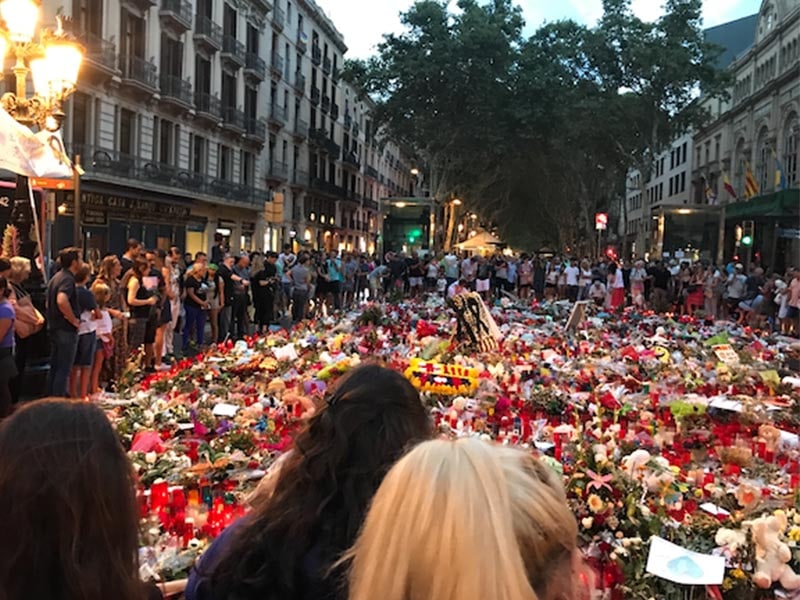
2017 – Tribute to victims of terrorist attack on Les Rambles.
Helena Ruiz talks about the Raval neighborhood in Barcelona’s Old City. The Raval neighborhood, where I now live, seemed too dangerous as a teenager. I was scared to walk alone, even in broad daylight And now I’ve been there for five years. Yet, the Raval is changing, and not for the best. Well, not worse than it was 20 years ago, but it’s lost much of its charm. It does have some very artistic areas. Around Rambla de Raval, you’ll find art made of abandoned furniture–painted, lying on the ground. It’s called, “Art is Trash.” It’s quite beautiful, but if you just head south a few streets, you’ll find…I’m not sure how to explain it. It’s a constant stream of tourists, which affects businesses, bringing us back to the earlier issue. In the Raval, there aren’t few storefronts for people living in Barcelona. It’s all for the tourists. .
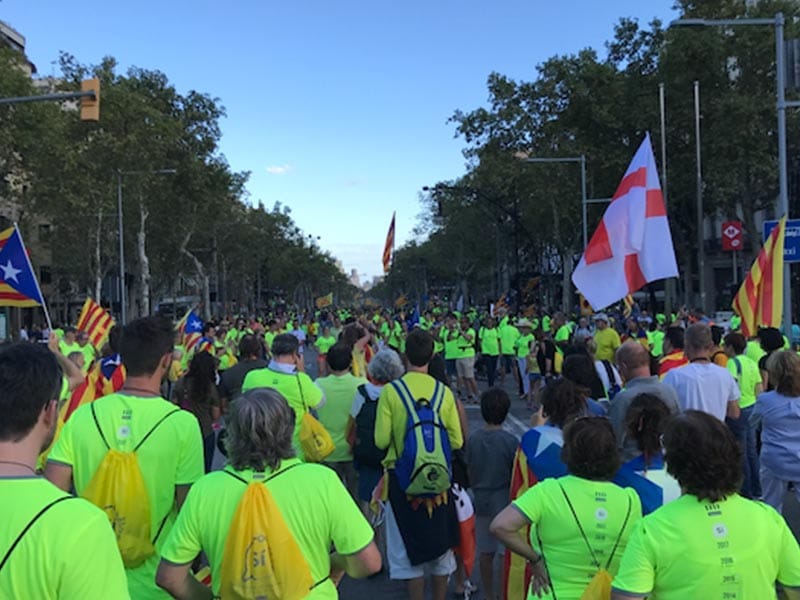
2017 – Barcelona citizens celebrate La Diada, the National Day of Catalonia.
Alexis Plaza expresses concern over Barça management. Personally, I’m quite disappointed with the current board, which signed Neymar up. We were presented a sign for 95 million euros. Later, it was proven that it wasn’t true, that he had been signed for much more, maybe around 200 million euros, we don’t know the real number. What we do know is that we have been reported by the district attorney’s office, by the tax office. The Barça has come out with a bad image because its former president, Rossell, and the actual president, Bartomeu, ended up making a deal with the district attorney’s office to pay a fine. A fine that will have to pay the club, which dirties the good name of the team. We still don’t know the fees of the opposing lawyers that we will need to pay too, which surely will be around 2 million euros. After all this, the player has been sold for 222[millions]. A transaction, in my opinion, a bit suspicios, since the player had been renewed only two months before and, speaking of the second best player in the world, a clause of 222 million seems ridiculous. All this brings some suspicion to the agreements with Qatar, the way Barça has mistreated Qatar and Qatar airways. The player, Neymar, is the sports image of the Qatar world cup and curiously he leaves for a small league, like the French is, to a team that is presided by a Qatari prince. That’s why I’m angry with the actual board.
Lluís Cabrera explains why the autonomous movement forked into an independence movement. Understand that here there are several subjects to address. Both PSOE and PP were wrong in not accepting the statute Pascual Maragall proposed. Back then, president of the Generalitat. The tri-party, composed of the PSC, Esquerra, and Iniciativa per Catalunya back then. Rodriguez Zapatero said, “Yes, I’ll accept…” …the statute that comes from the parliament of Catalonia.” That didn’t happen. It was cut. The PP collected signatures, which was among their biggest mistakes. We’ll see in the next elections. At the time, it won them many votes. Anti- Catalanism, in some regions, gets you votes. .
Meritxell Campmany on why a new Catalan state is problematic.I feel Catalan but I see states as obsolete, 19th century structures. They no longer make sense, so I’m not comfortable with a new state. States, as we’ve devised them, don’t work. I think Europe, and even multinationals, have been afforded a great deal of sovereignty So, reproducing the structure of a state in Catalunya… I don’t like it. I don’t like it because I don’t think it’s the solution. The solution is the opposite. It’s lending more autonomy to small nuclei, such as autonomies or other structures. We should give them more importance and sovereignty in Europe. I do not like the idea of a state, nor the idea of reproducing what we have in Spain into a new Catalunya. And maybe I disagree with most opinions in my field, but I do not think it’s… Problems abound with the current situation. Both sides have made their share of mistakes. They don’t listen to each other, and ignoring one another doesn’t solve anything. But creating a state, and erecting structures proven not to work, it’s not a solution.
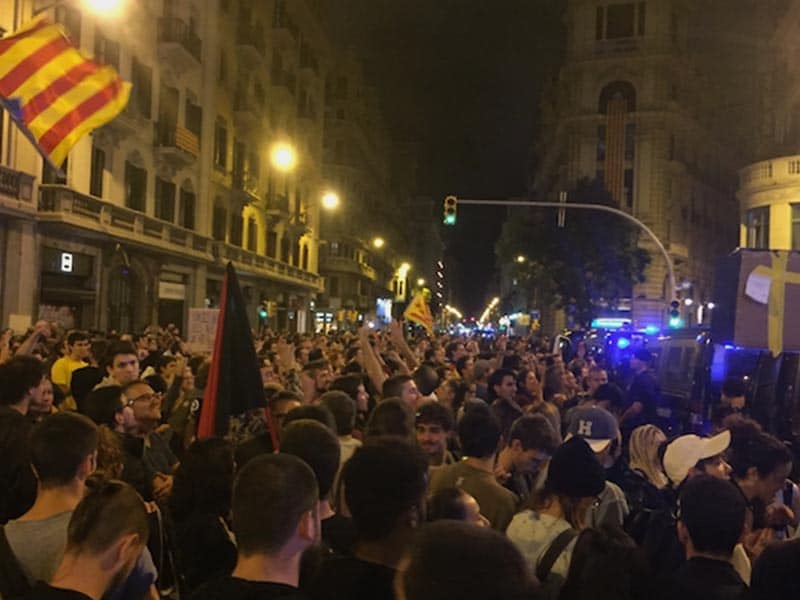
2017 – Protests on Barcelona’s Via Laietana during Spain’s Constitutional Crisis
Roger Montañola discusses Barcelona’s hosting of Mobile World Congress. The Mobile World Congress is a discovery we Catalans made recently. Today, we’re the experts, but just a few years ago, nobody understood it. Luckily for us, Barcelona, just a few years ago, at Fira de Barcelona, hosted, if memory serves me, 3GSM, which was the initial exposition. It was a forum where vendors and people working in the mobile space converged. Simultaneously, we experienced an explosion in mobile. This placed us in the position to host the Congress. So, everything occurred in parallel. It was a complete coincidence, and they did a good job. In this regard, institutions here have excelled. But, to repeat, there is still a ways to go. And what is it? It’s ground zero, across the globe, for everything related to mobile telephony, mobile tech, etc. So, it’s a privilege, one that we should hold on to.
